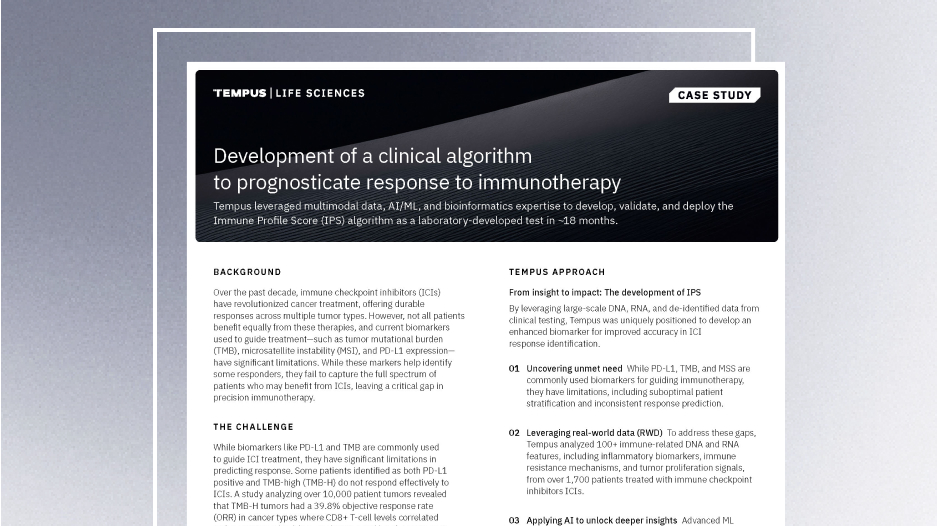-
PROVIDERS
Watch now
Are you getting the full picture? A webinar series on the power of comprehensive intelligent diagnostics
-
LIFE SCIENCES
REGISTER NOW
AI & ML in action: Demonstrating real-world impact in trial design & patient careThursday, June 12, 2025
11 AM PT / 1 PM CT /
2 PM ET -
PATIENTS
It's About Time
View the Tempus vision.
- RESOURCES
-
ABOUT US
View Job Postings
We’re looking for people who can change the world.
- INVESTORS
09/09/2021
A patient-centric approach to transforming healthcare
Authors
Eric Lefkofsky and Lauren Silvis
We’re all patients at points in our lives. We might be looking for a different treatment option in our ongoing battle against cancer, trying to understand our risk of developing a rare heart condition, or waiting to learn whether we have a new infectious disease. At these moments, we should have more than just a test result to inform our care. At these moments, we should know that the information we’re getting about our own health is also powered by data generated across our healthcare system.
At Tempus, we’re harnessing the power of clinical and genomic data to better understand each patient’s unique profile. By curating, structuring, and combining data from diverse sources, including our powerful sequencing technologies, we’re able to derive new insights to help advance patient care. We might identify a novel targeted therapy for an oncologist to consider, find a promising clinical trial, or pinpoint the origin of a patient’s cancer. We can do this because we’re committed to a data-driven approach in all we do.
Our work to transform healthcare starts with developing smarter tests. We’re putting the building blocks in place for artificial intelligence to have a more meaningful impact on patient outcomes. First, our intelligent diagnostics leverage de-identified data that’s carefully curated and analyzed. We then use machine learning on diverse data sets and incorporate imaging, sequencing, and biological models into our multi-modal process. Our thorough and comprehensive approach to analytics sets us apart in the development of next-stage testing technologies. We’re employing these strategies to generate better diagnostic and prognostic algorithms. Our test development framework is designed to help doctors and patients make more informed decisions in an increasingly complex world of treatment options.
We believe that personalized medicine means both advancing care for individual patients and advancing therapy development for the next generation of patients. We’re using data and insights not only to build smarter tests, but also to drive forward research into new treatments. Our multi-modal data can be used to discover and validate novel biomarkers, identify increasingly rare subpopulations, and characterize new indications. With these tools, we partner with leading research institutions and biomedical innovators to support clinical trials and promote drug discovery.
But perhaps the most audacious thing we’re doing at Tempus is deploying this approach across diseases, taking on some of the biggest challenges in healthcare. We’re tackling broad public health concerns as well as rare and debilitating conditions. Tempus started by focusing on the 1 in 3 people who will be diagnosed with cancer in their lifetime. Today, we’re thinking about the more than 16 million adults in the United States who have had at least one major depressive episode. We’re asking ourselves what we can do to help the 2.7 million Americans living with atrial fibrillation, which can lead to blood clots, stroke, and heart failure. We’re creating a data infrastructure for the future because we expect that we’ll continue to be threatened by emerging infectious diseases.
These challenges are big and they are real. But transformative technology cannot be singular in its application. Our platform approach to aggregating data, developing and validating insights, and then advancing both individual patient care and new therapy development is truly disease agnostic. As we develop smarter tests and deploy artificial intelligence across diseases, we’re building the healthcare algorithms of the future. We believe that we’ll be able to predict the risk of disease, response to treatment, and likelihood of specific health outcomes. We’re combining these tools to empower doctors and patients to manage their health on a deeply personal level. Because when we’re on that patient journey, we want the healthcare insights that only data and technology at scale can deliver.
-
06/09/2025
Bridging the translational gap: The role of organoids in oncology R&D
This white paper explores the evolving role of organoids in oncology R&D, highlighting their potential as predictive preclinical models and their ability to reduce translational risk. Download for a comprehensive overview of the scientific landscape, key adoption barriers, emerging innovations, and how pharma companies leverage organoids to accelerate precision medicine.
Read more -
03/25/2025
The RNA advantage: A multimodal approach to accelerating oncology R&D
Discover how transcriptomic data and multi-omics data integrated with AI is helping revolutionize oncology drug development and patient care and fueling precision medicine 2.0. Learn about RNA sequencing’s role in companion diagnostics and Tempus Loop’s capabilities to support target identification and validation.
Watch replay
Secure your recording now. -
04/02/2025
Development of a clinical algorithm to prognosticate response to immunotherapy
Discover how Tempus developed and deployed the Immune Profile Score (IPS)—a powerful algorithm that provides prognostic insights into patient outcomes following treatment with immune checkpoint inhibitors (ICIs)—in ~18 months. This case study highlights the AI-driven methodology, real-world validation, and the impact of IPS in precision oncology.
Read more


